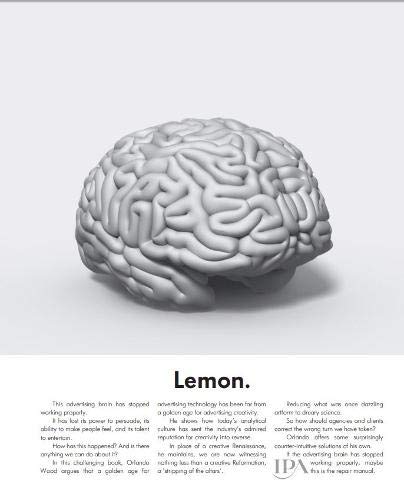

Full description not available
M**N
So many quotable gems
I am that person who needs to remind themselves which arm* sported the scout proficiency badges before I can figure out which is my right and which is my left, For me, this excellently researched and cleverly argued book is a brilliant addition to the left brain/right brain educational canon analysing and explaining and illustrating how we think, feel and communicate. It’s delivered with surprisingly rewarding and entertaining originality for a ‘school’ book. It is rammed with both proof and anecdote to help you argue the case for the power of human creativity in delivering effective communication. When I was growing up, I was taught this formula for brand comms success: Relevant + Distinctive = More Effective. After 40 years in adland, the first 20 of them spend in analogue, I know full well that advertising is no longer working as well as it used to and that the arrival of the digital activation channels have made it a lot worse (after an initial novelty fillip). I also blame the hiving off of the media department into separate (profit making) entities; a cohort that then proceeded to lose the team plot and stop talking to anyone else who might have a contribution to making the work work – like the strategists and, vitally, the creatives. Something must be done. My contribution, having read Lemon, is to amend my brand comms success formula to Relevant + Entertaining + Distinctive = More Effective. Brands that we can recognise quickly, come easily to mind and feel good (fame, fluency and feeling) are more valued. Simples.If you are into feeding your head, keen to break the left brain dominance Google Gonzo Advertising Thinking (where you never go beyond the first page in your searches and so never have an original thought), this is a book you must invest in. It will inspire.*the right
G**R
Upskill in your left vs right brain knowledge
This book is a fascinating insight into the latest understanding on how the brain works and impacts on our appreciation of culture and society, and thus the effectiveness of creative communications. If you are in marketing, you need this.
D**A
Thought provoking
Orlando’s book makes some very good points about how to construct memorable advertising without having to merely resort to the ‘best practices’ encouraged by social media platforms and the book contains some great tips to help sell work in to clients in a world where the creative hunch isn’t enough.
E**N
A wonderfully insightful read.
as somebody who works in the creative side of advertising, i thoroughly enjoyed Wood's hypotheses and how he brings them to life through cultural references as well as hard figures. easily the most interesting, thought-provoking and inspiring marketing book I have read in a long time. a must-read for anybody in the industry but also hugely relevant for anybody with an interest in shifts in how different cultures and societies have consumed art and creativity over the centuries.
B**N
The Advertising must read
It’s impossible to underestimate how important this book is for anyone involved in making advertising of any kind. Apparently the best creativity hasn’t changed for 100s of years and so we must learn from that.
A**L
Marketing Must Know
This unlocked a lot of thinking for me. Any advertising or marketing professional must read this.
R**A
Highly recommend
Pure brilliance
T**M
Provocative and Original look at Advertising
Most books on marketing effectiveness tend to feel quite similar - much worthy consideration of channels, selling points, distinctive assets, messages and so on. Lemon is different. While its first chapter covers familiar ground - the work of Les Binet and Peter Field on the IPA database and their conclusion that creativity is in crisis - the book soon goes in its own, highly original, direction.The second chapter, for instance, is a whistle-stop tour of western culture from the Late Roman Empire to Modernism, in the service of Orlando Wood’s overarching idea - that not just advertising, but culture as a whole, are in thrall to a “left-brained” mode of thinking. The book demonstrates how this operates in ads - with a beautiful close-reading of an old Heineken spot - and introduces quantitative data as proof of its wider idea of a left-brained worldview on the rise. Finally, Wood digs into the nuts and bolts of agency practise, from pitching to procurement to research, asking at every stage how more holistic right-brained thinking can be encouraged and preserved.Lemon is an ambitious and wide-ranging book, refreshingly unafraid of dealing with ideas on a grand scale. To some extent the value it has lies in how far you agree with its ideas about left- and right-brained thinking. This concept has come in for a battering in recent years but Lemon draws on more recent work by the psychiatrist and neuroscientist Iain McGilchrist which makes a convincing argument that the real difference between the two hemispheres lies in the ways they pay attention to the world, not in what they “do”.Even if you aren’t wholly convinced by that, Lemon is useful as a lens to look at advertising with and the broad styles and aesthetics of ads it identifies are surely real. Ad thinking recently has been very strategy-centric, obsessed by ideas and their iterations. Lemon makes a good case that this priority is irredeemably left-brained, and asks us to look first and foremost at the work itself. For that alone, it’s a radical book.
Trustpilot
1 week ago
5 days ago